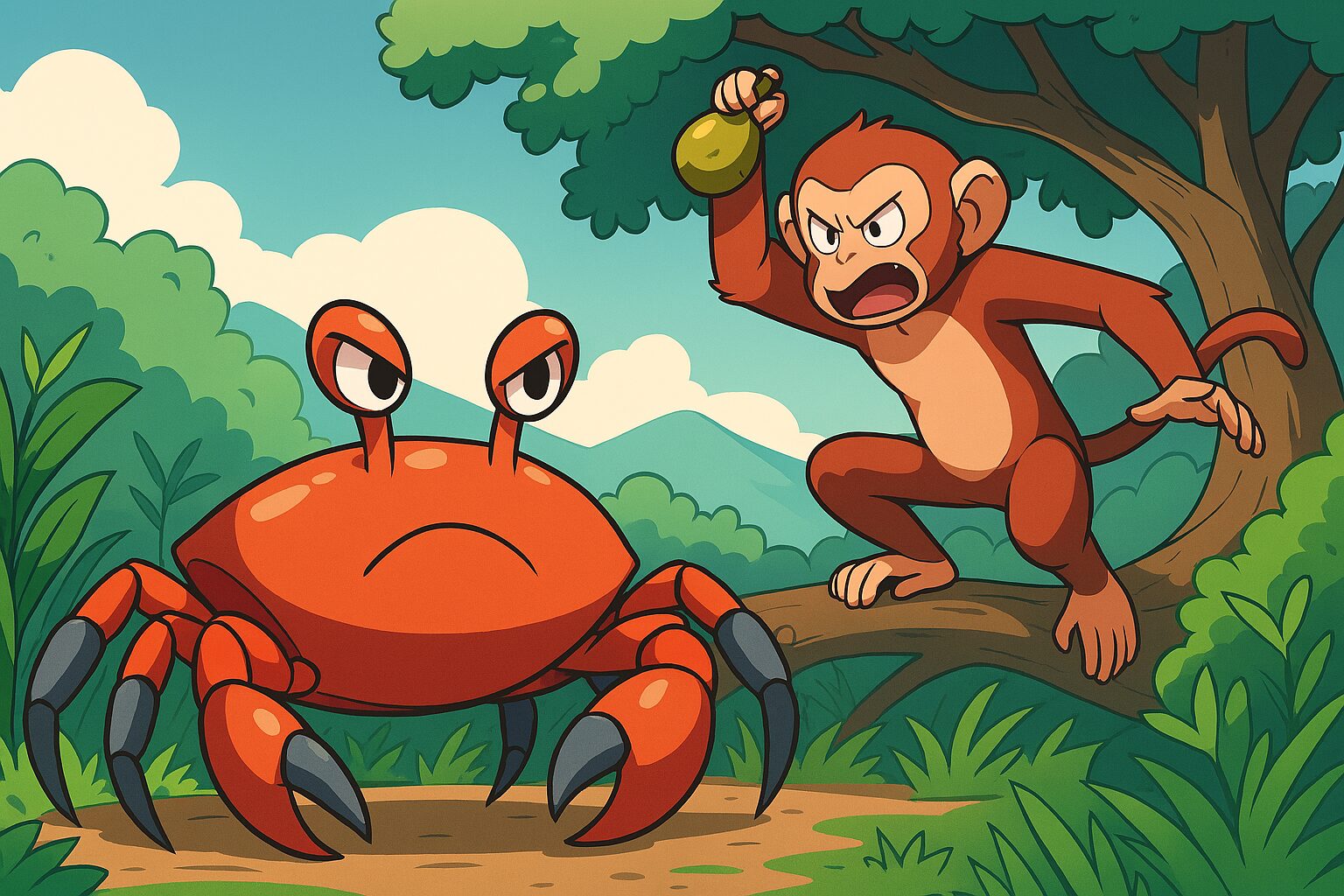This article introduces the classic Japanese folktale “Saru Kani Gassen” in a richly detailed narrative, followed by cultural analysis for international readers.
- 📖 The Story: Where Greed Meets Retribution
- 🐣 The Children’s Resolve and the Allies’ Revenge
- 🔍 Cultural Analysis: What This Folktale Teaches Us
- 🌍 Universal Themes for Global Readers
- 🔗 Related Link
- ✨ Closing Thoughts: Bridging Cultures Through Story
- はじめに:昔話は「子ども向け」だけではない
- 📖 物語:猿と蟹の運命の交差点
- 🐣 子蟹たちの決意と仲間たちの登場
- 🔍 分析:猿蟹合戦に込められたメッセージ
- 🌍 海外読者へのメッセージ:これは「人間の物語」
- 🔗 関連リンク
- ✨ おわりに:物語を通じて文化をつなぐ
📖 The Story: Where Greed Meets Retribution
Long ago, in a quiet village nestled between mountains and rivers, a crab lived peacefully by the stream. One sunny day, the crab discovered a glistening rice ball lying on the riverbank. Wrapped in seaweed and plump with grains, it sparkled like a treasure under the sun.
Just then, a monkey leapt down from a tree and spotted the rice ball. “Hey there, Crab,” he said slyly. “That’s a fine snack you’ve got. But I have something even better—a persimmon seed. If you plant it, it’ll grow into a tree full of sweet fruit. Want to trade?”
The crab, trusting and curious, agreed. He handed over the rice ball and took the seed home. With care and devotion, he planted it in his garden, watering it daily and watching it grow. Seasons passed, and the seed sprouted into a tall tree, its branches heavy with golden persimmons.
Overjoyed, the crab invited the monkey to share the harvest. But once the monkey climbed the tree, he greedily devoured the ripe fruit, tossing the unripe ones down. “Here, eat this!” he shouted, hurling a hard green persimmon at the crab.
The crab was struck and fatally wounded. His shell cracked, and he collapsed beneath the tree. The wind fell silent. The monkey vanished, leaving only grief behind.
🐣 The Children’s Resolve and the Allies’ Revenge
The crab had children. Mourning their mother’s death, they vowed to seek justice. “We can’t defeat the monkey alone,” they said. “Let’s gather allies.”
They called upon their mother’s old friends: a millstone, a chestnut, a bee, and a cow dung. Each agreed to help. Together, they devised a plan and waited inside the monkey’s house.
- The millstone hid atop the ceiling beam.
- The chestnut buried itself in the hearth’s ashes.
- The bee nestled inside the cupboard.
- The cow dung lay across the doorway.
- The crab children hid quietly, watching.
When the monkey returned home, he lit the hearth. The chestnut exploded, burning his face. He opened the cupboard—only to be stung by the bee. Panicked, he ran toward the door, slipped on the dung, and fell. At that moment, the millstone dropped from above, crushing him.
The crab children emerged. “This is the price of betrayal,” they said. Justice was served—not by strength, but by unity and wisdom.
🔍 Cultural Analysis: What This Folktale Teaches Us
1. The Dangers of Greed and Deceit
The monkey begins as a clever trader but descends into selfishness and violence. His downfall mirrors real-world abuses of power and the consequences of unchecked desire.
2. Wisdom and Solidarity Among the Weak
The crab’s children and their allies are not warriors—but each uses their unique traits to overcome injustice. This reflects Japan’s cultural emphasis on cooperation, trust, and strategic thinking.
3. Karma and Moral Justice
Deeply rooted in Buddhist thought, the concept of “inga ōhō” (cause and effect) underpins the story. The monkey isn’t punished by law—he’s undone by his own actions. This resonates with global ideas of karma and poetic justice.
🌍 Universal Themes for Global Readers
Though uniquely Japanese, Saru Kani Gassen speaks to universal human experiences. Betrayal, resilience, and justice transcend borders.
| Theme | Japanese Context | Global Parallel |
|---|---|---|
| Greed and Betrayal | Buddhist moral caution | Prometheus in Greek mythology |
| Solidarity of the Weak | “En” (social bonds) | Grassroots movements, democratic alliances |
| Justice Restored | Inga ōhō (cause and effect) | Karma, moral justice |
| Emotional Silence | Japanese aesthetic of “yohaku” (emptiness) | Hemingway’s iceberg theory |
🔗 Related Link
✨ Closing Thoughts: Bridging Cultures Through Story
Saru Kani Gassen is more than a tale of revenge—it’s a mirror reflecting the values of justice, empathy, and resilience. Through its vivid characters and layered symbolism, it invites readers to reflect on their own moral compass.
As we continue exploring Japanese folktales, we’ll uncover more stories that connect hearts across cultures. Stay tuned for upcoming features on “The Tongue-Cut Sparrow” and “The Lump-Removing Old Man”—each with its own lesson and emotional depth.
© 2025 Yuta Matsuura | Sharing Japan’s soul through storytelling
🐒猿蟹合戦|裏切りと知恵が交差する日本昔話の深層
はじめに:昔話は「子ども向け」だけではない
日本の昔話には、単なる教訓以上のものが込められています。人間の欲望、社会の構造、そして正義のあり方――それらを象徴的に描いた物語が数多く存在します。
今回ご紹介する「猿蟹合戦」は、海外の読者にも響くテーマを持つ物語です。裏切りと復讐、弱者の連帯、そして因果応報という普遍的な要素を、わかりやすく、そして情緒豊かにお届けします。
📖 物語:猿と蟹の運命の交差点
むかしむかし、川辺で一匹の蟹が美味しそうなおにぎりを見つけました。その姿を見た猿が近づき、「おにぎりと、僕の持っている柿の種を交換しよう」と提案します。蟹は素直に応じ、柿の種を受け取ります。
蟹はその種を庭に植え、毎日水をやり、太陽に感謝しながら育てました。やがて柿の木は立派に育ち、秋にはたくさんの実をつけました。
蟹は猿を呼び、「一緒に食べよう」と声をかけます。しかし猿は木に登り、熟した柿を独り占め。蟹が「私にもください」と頼むと、猿は怒って青柿を投げつけ、蟹を打ち倒してしまいます。
蟹は命を落とし、物語は悲劇へと転じます。
🐣 子蟹たちの決意と仲間たちの登場
母を失った子蟹たちは、深い悲しみの中で立ち上がります。「母の仇を討とう。でも僕たちだけでは無理だ。仲間を集めよう。」
彼らは、母の友人である臼、蜂、栗、牛糞に助けを求めます。皆は快く協力を約束し、猿の家で復讐の計画を立てます。
- 臼は天井の梁の上に。
- 栗は囲炉裏の灰の中に。
- 蜂は戸棚の隙間に。
- 牛糞は玄関の敷居に。
- 子蟹たちは隠れて様子をうかがいます。
猿が帰宅し、囲炉裏に火を入れると、栗が爆発して顔に当たり、火傷を負います。戸棚を開けると蜂が刺し、玄関で滑って転んだところへ臼が落下。猿は力尽き、蟹の子どもたちは母の仇を討ちます。
🔍 分析:猿蟹合戦に込められたメッセージ
① 欲望と裏切りの危険性
猿は最初、ただの交換相手でした。しかし、欲望に飲み込まれ、理性を失い、暴力に走ります。これは現代社会における「情報の独占」や「権力の濫用」にも通じる構造です。
② 弱者の知恵と連帯
蟹の子どもたちは、力ではなく知恵と仲間の力で猿に立ち向かいます。臼や栗、蜂、牛糞といった「戦闘力のない存在」が、それぞれの特性を活かして勝利に導く姿は、現代のチーム戦略や社会運動にも通じます。
③ 因果応報という仏教的世界観
日本文化に根付く「因果応報」の思想が、物語の根底にあります。猿は誰かに裁かれるのではなく、自らの行動によって滅びます。これは「カルマ」や「モラル・ジャスティス」といったグローバルな概念にも通じます。
🌍 海外読者へのメッセージ:これは「人間の物語」
猿蟹合戦は、日本の昔話でありながら、世界中の人々が共感できるテーマを持っています。
| テーマ | 日本文化での意味 | グローバルな類似 |
|---|---|---|
| 欲望と裏切り | 仏教的な戒め | ギリシャ神話のプロメテウスなど |
| 弱者の連帯 | 縁と協力 | 民主主義的な連携、社会運動 |
| 正義の回復 | 因果応報 | カルマ、モラル・ジャスティス |
| 物語の余白 | 哀悼と静寂 | ヘミングウェイ的な「語られない感情」 |
この物語を通じて、日本文化の奥深さと、人間の感情の普遍性に触れていただけたら嬉しいです。
🔗 関連リンク
✨ おわりに:物語を通じて文化をつなぐ
猿蟹合戦は、単なる復讐劇ではありません。そこには、弱者の知恵、連帯、そして正義の回復という普遍的なテーマが込められています。
このブログでは、今後も日本の昔話や文化を、海外の読者にもわかりやすく、そして心に響く形で紹介していきます。次回は「舌切り雀」や「こぶとり爺さん」など、また違った角度から人間の本質に迫る物語をご紹介予定です。



コメント